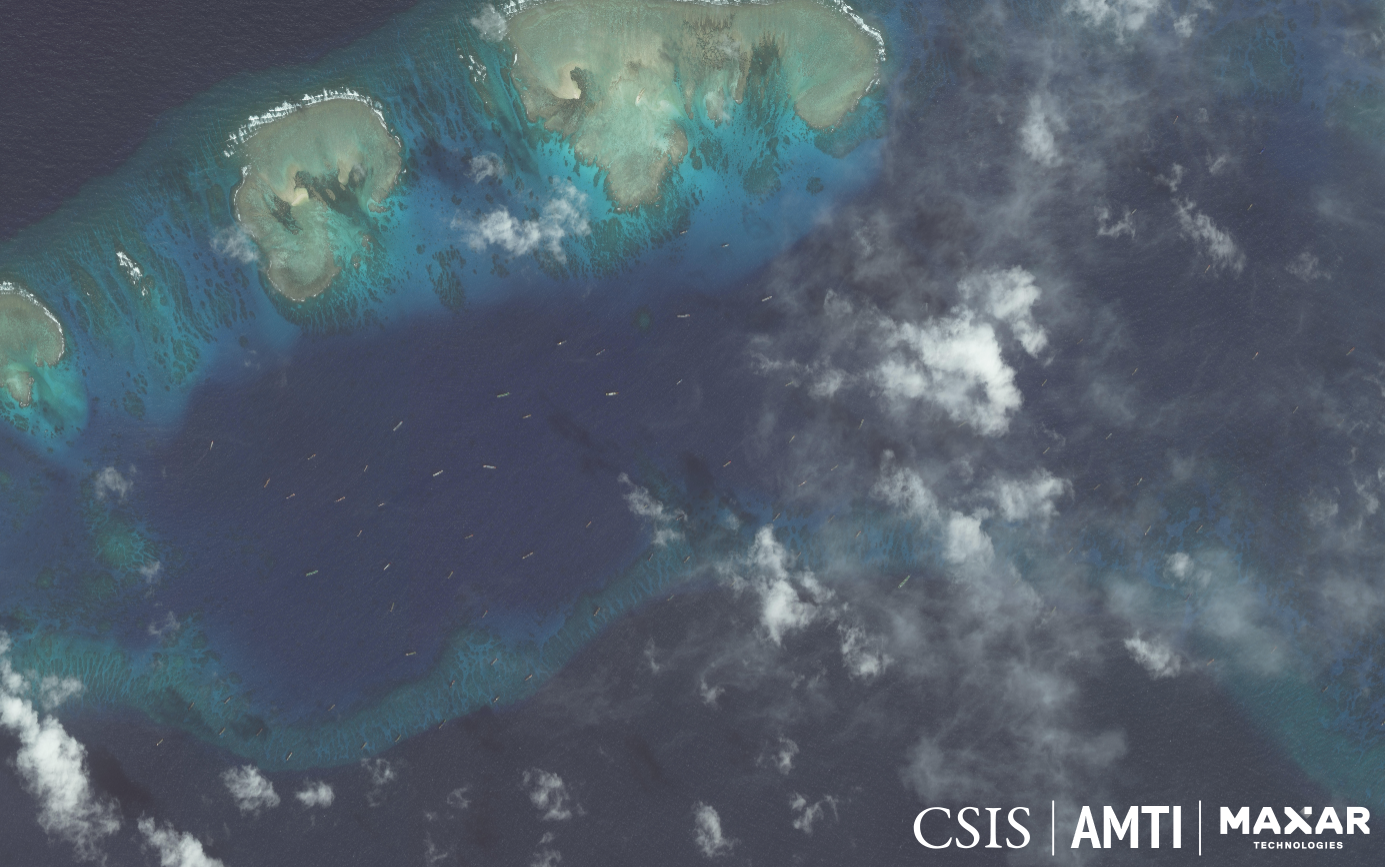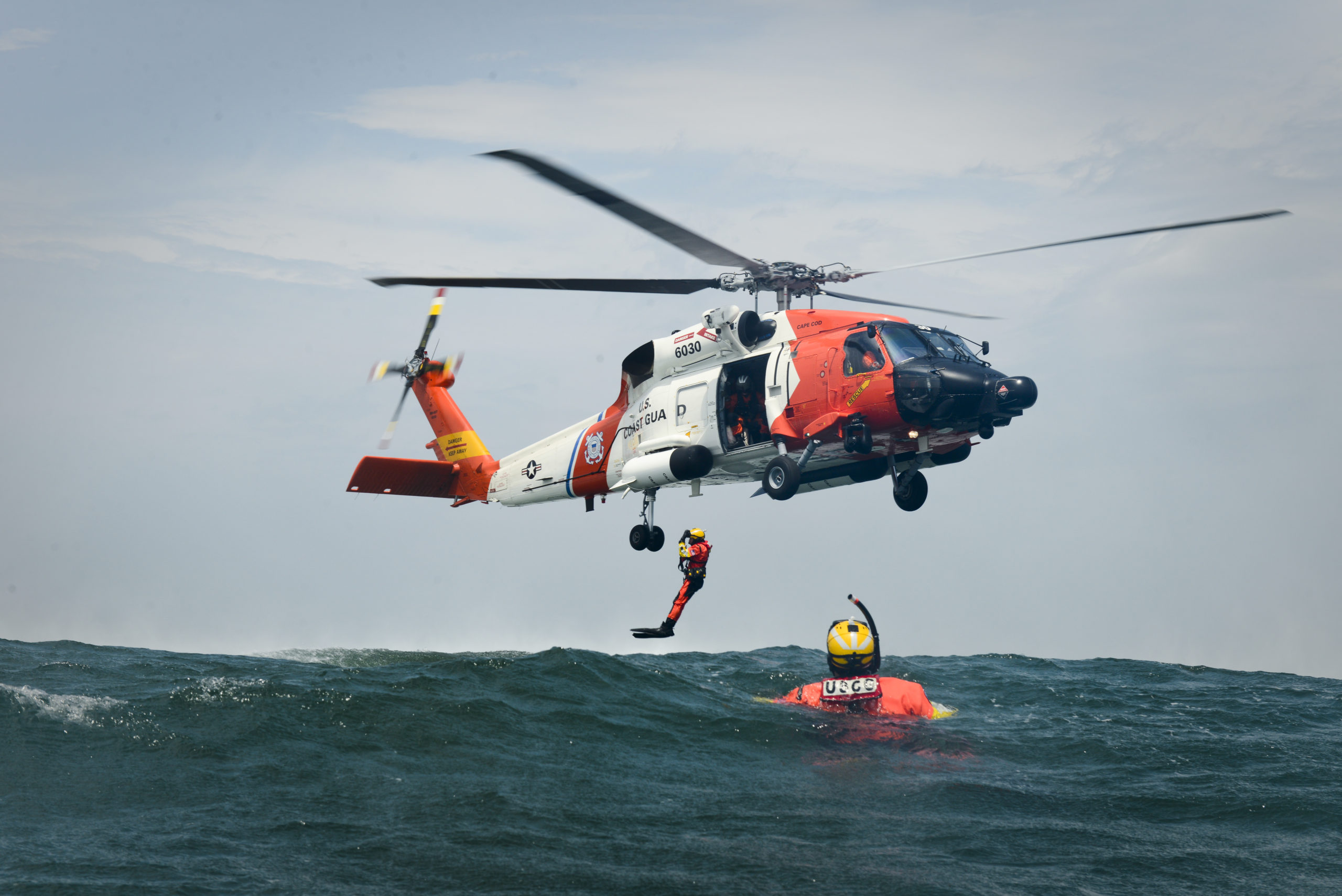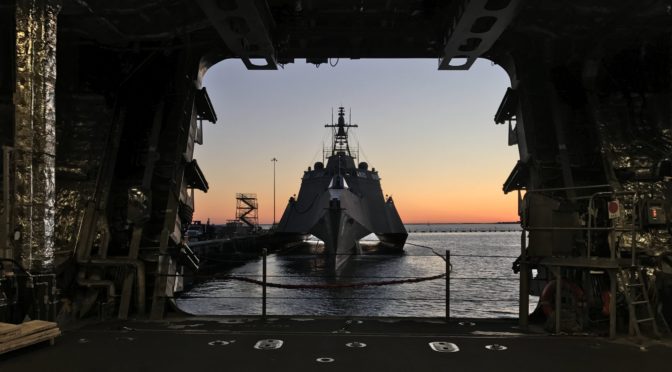By Josh Tallis
Introduction
The United States sea services—the Navy, Marine Corps, and Coast Guard—are regularly underway and forward-deployed, carrying out routine activities and exercises daily. These activities are technically demanding, expensive, and occasionally dangerous. Consequently, the services face pressure to explain how their typical activities at sea support national strategy, which today means answering how the sea services compete, day-to-day, in an era of strategic competition with great powers. In other words, do the regular functions of the sea services figure in U.S. national strategy, and if not, what must they do to adapt to competition? In so answering that question, we can gain a deeper insight into what it means to compete more fundamentally in the modern era.
Policy implications for how the sea services must adapt to competition with great power rivals should begin with a concept of where day-to-day activities intersect with national strategy. The sea services require a defined strategic objective of day-to-day competition, which this article argues is U.S. leadership of the international order. This framing has operational and strategic ramifications. Operationally, it means that “smaller” maritime missions are now some of the sea services’ most important functions. Strategically, this is an important observation, as despite being a longstanding part of Navy, Marine Corps, and Coast Guard history, maritime security infrequently drives or derives logically from overarching strategic concepts. The services must therefore adapt to meet the strategic challenges of competition. This means rethinking core aspects of Navy and Marine Corps policy and the Coast Guard’s operational priorities. It also augurs an even broader need for creative thinking about how the U.S. should incorporate lesser adversaries (e.g., Iran, North Korea, and non-state actors) into the context of competition with great power rivals, something that is particularly absent in contemporary strategy.
“Winning” the Competition
Defining the strategic objective of competition is foundational to our understanding of the day-to-day functions of U.S. sea services. If victory is the objective, what constitutes victory? And if the sea services seek to win, what are they trying to win? In exploring the definition of victory, we obtain a clearer understanding of the nature of the competition. Two different theories of victory are emerging. They rely on complimentary concepts but fundamentally represent different underlying visions of success.
One theory of victory is positional. Positional success is deterring conflict or, failing that, creating conditions for success in the event of a conflict. With victory understood in that largely operational context, competition would seem a matter of geographic positioning of U.S. assets, which would result in contests over access, basing, postures, and capable allies. U.S.-China contestation over key terrain such as Djibouti or the Philippines offer examples of this positional battle.
The other theory of victory is political. Political success is continued U.S. security and economic leadership of an international order that reflects U.S. values. With victory understood in that geostrategic context, competition becomes a matter of global agenda setting, which would result in competition over the international order, its character, its values, and its norms. U.S. contestation of Russian sovereignty claims in the Northern Sea Route, or Chinese claims over territoriality in the South China Sea, represent competition on this political plane.
Although both the positional and political theories of victory represent necessary activities on the part of the military, they offer competing visions of the role of U.S. sea services in day-to-day competition. Is it to deter conflict—imposing costs on adversaries—or to win without fighting—building a political order that offers sufficient benefits to make revisions difficult or undesirable? The positional vision is ultimately about deterring and preparing for conflict, not competition. As a result, the political theory of victory is more important when evaluating U.S. sea services and their role in day-to-day competition.
This conclusion is rooted in the very concept of strategic competition. If the present is an era defined by competition between great powers, what makes a power great? No theoretical architecture in U.S. strategy answers this question, but one particularly instructive definition offered scholars such as Nick Bisley and Bear Braumoeller is that great power status reflects a state’s outsized stake in, and effect on, the international order. If the order is central to what makes powers great, then great power competition is more than just a matter of conflict, it is political—it is a battle over the order.
“Winning” the Global Order
If we understand the nature of day-to-day competition with great powers to be a political, not positional, contest, how might the sea services identify barriers to victory? We can think about threats to the international order in two buckets—order defense and order maintenance.
First, the order could collapse abruptly, likely through a violent overthrow of the existing order. And if great powers are those with an outsized effect on the order, great powers are then the likeliest candidates to force a violent reversal of the prevailing order. In other words, the first type of threat to the international order is a great power war, a risk for which the sea services spend significant resources deterring and preparing to defeat.
The second threat relates to the order’s long-term health. An order can erode, through lack of proactive maintenance on the part of its steward, and it can corrode, through the persistent malign activities of both large and small actors. U.S. strategists are often concerned with avoiding a total collapse of the system (defending the order). Yet day-to-day competition is a function of understanding how to sustain the United States’ position in, and the character of, the existing system over a long time horizon and against subtle threats. It is about avoiding death by a thousand cuts, policing norms and ensuring the credibility of the institutions and rules that benefit the U.S. and its partners.

Credibility is an operative word when describing competition over the international order. The current, U.S.-led order is successful in part because association with it is somewhat voluntary—states aspire to join its commercial and political structures because an American security umbrella and predictable economic rules create a largely safe, stable, and prosperous dynamic. The desirability of participating in that structure is partially contingent on U.S. credibility sustaining certain core commitments, many of them stemming from the sea. These obligations—ensuring freedom of navigation, enforcing international norms, enforcing multilateral sanctions, containing terrorism and piracy—represent fundamental maritime security tasks that promote the maintenance and success of the order. The low-end maritime security missions that bolster U.S. credibility as capable of enforcing core security and economic norms are central to day-to-day competition.

The objective of maritime security (or, good order at sea) is to sustain and enforce the rule of law, to promote the mutual gains that encourage nations to trust in and rely on the United States, and to protect the legitimate uses of global commons that keep the world prosperous and safe from major conflict. To maintain the U.S. position at the helm of the international order is to pursue maritime security. To fail to pursue maritime security is to concede rulemaking and rule breaking to competitors, creating a less desirable and beneficial order and thus facilitating its erosion or corrosion. Countries that fall further from the U.S.-led order will have China (and to a lesser extent, Russia) to turn to as partners in facilitating the construction of robust alternatives.
The Sea Services as Unique Instruments of Competition
The Navy, Marine Corps, and Coast Guard are not just a part of maintaining the international order, they are critical to it. The ability to deliver dynamic, calibrated coercion or reassurance without a large footprint is a longstanding benefit of seapower. Each force (and the Navy in particular) has historically served as primary levers in the pursuit of good order at and from the sea because they provide policymakers with unique coercive and diplomatic tools. As one CNA report remarks of the Navy, the force has “almost always been involved in smaller-scale contingencies (SSC) and operations other than war (OOTW). For long stretches, these operations were all that the Navy did.” Even as strategic competition has reinvigorated attention to great power wars, the missions that U.S. leaders pursue in practice reflect a reality that is equally if not more concerned with the maintenance of the U.S.-led order (e.g., freedom of navigation operations, presence operations, sanctions enforcement, counterterrorism, and capacity building).
There is little evidence that great power competition will disrupt policymakers’ use of the sea services in pursuit of order maintenance. Such are core functions for the Coast Guard. And for the Navy and Marine Corps, the forces historically balanced small-scale missions with preparations for conflict. That these operations did not produce a substantial effect on strategy is what should concern us today. Despite being a dominant part of naval history, maritime security is often pursued as an annex to strategy, not logically derived from it. Policymakers can help avoid that mistake in this era, which begins by understanding good order at sea as central to, not an appendage of, great power competition.
Implications for the Sea Services and Strategy
This assessment yields implications for Navy and Marine Corps policy, Coast Guard priorities, and U.S. strategy. First, the Navy and Marine Corps must reflect the rising strategic prominence of day-to-day competitive tasks in their policies. Decisions over where the sister services station forces, what the Navy buys to deploy those forces, and what both services do with the platforms they send forward should all include some assessment of their impact on day-to-day competition. In practice that should mean a more dispersed fleet to compete effectively in more places at once. It should also mean an increase in the number of smaller platforms the Navy fields (including with embarked Marines), designed to support maritime security missions in African, Latin American, and Indian Ocean waters. The forces should also operationally prioritize, to a much greater extent than they do currently, low-end missions, affording them a place of prominence in internal decisions regarding force allocation, readiness, and external communications about what they are doing and why.
Second, the Coast Guard does (and should continue to) play an integral role in reinforcing good order at sea and compliance with international norms. It is uniquely situated to do so regarding key issues in day-to-day-day competition such as maintaining rule of law, including through fisheries enforcement and promoting U.S. sovereignty in the Arctic. The Coast Guard will also continue to serve as an agent of U.S. law enforcement, and thus cannot always act strictly with an eye toward maintenance of the international order in a time of strategic competition. Yet the Coast Guard must make hard choices where those obligations conflict (i.e., system maintenance versus other constabulary duties), and policymakers must evaluate whether certain tasks optimally utilize a limited national resource to maximal effect in defense of core security and economic norms. Counter-drug missions in the Caribbean offer one such example. They consume high levels of Coast Guard resources, are doubtless important to its law enforcement functions, but represent a Sisyphean effort that may not optimally use finite assets in defense of the most important norms in the international order. That is the type of policy prioritization balance facing the Coast Guard in day-to-day competition.
Finally, despite emphases on China and Russia, the National Defense Strategy maintains the need for continued attention to Iran, North Korea, and terrorists, but at levels that do not hold U.S. forces hostage. U.S. strategy must therefore reflect how actors that are not great powers can undermine its ability to compete successfully with primary rivals. Even if only major powers can overthrow a global order, actors up and down the power spectrum can corrode an order so that it becomes less desirable. The result of such corrosion may not be a wholesale replacement of the order, but its weakening or fracturing. And since great powers are those with the most to benefit—and the greatest ability to capture incremental improvements—from such degradation, China and Russia stand to gain even when North Korea, Iran, pirates, or terrorists strain the order’s credibility. Thus, more than just great powers can influence the outcome of day-to-day competition. The sea services should deliberately incorporate lesser powers into their policies of great power competition to ensure that risks emanating from lesser powers neither overtake the focus on great powers nor disappear entirely in their wake.
Conclusion
Great power competition is not only about preparing for conflict, but also includes sustained, day-to-day competition regarding who most shapes the structure of the international order. The U.S. sea services—the Navy, Marine Corps, and Coast Guard—are uniquely positioned to wage this competition. They have historically served as tools for preserving rule of law at and from the sea in the past.
What is required now is for the sea services to articulate a clear theory of victory in the era of strategic competition, to recognize the relationship between competition and the small tasks that uphold the international order, and to prioritize policies and operations that reinforce the order upon which U.S. security and prosperity rests. In the process, a focus on the international order underscores the role of lesser adversaries as spoilers in strategic competition, whose malign actions can corrode the credibility of U.S. leadership to the benefit of China and Russia.
Whether combatting corrosion of the order by great powers or lesser adversaries, Navy, Marine Corps, and Coast Guard policy must adapt in order to prioritize, resource, and meet the demands of low-end missions in an era of great powers. Only then, as a function of preserving good order at sea, might the sea services achieve their measure of victory in this global competition.
Dr. Joshua Tallis is a research scientist at the Center for Naval Analyses and an adjunct professor at the George Washington University specializing in maritime security, polar affairs, and naval strategy. He is the author of the 2019 book, The War for Muddy Waters: Pirates, Terrorists, Traffickers, and Maritime Insecurity and the recent CNA report, Maritime Security and Great Power Competition: Maintaining the U.S.-led International Order, from which this article is partially derived. The opinions in this article do not necessarily reflect those of CNA or the U.S. Navy.
Featured Image: SAN DIEGO (March 3, 2017) USS Jackson (LCS 6) is pierside during sunset. (U.S. Navy photo by Lt. Miranda V. Williams/Released)


A marvelous and challenging argument for the central importance of the small, local, immediate, experienced forces as one of the pillars supporting maritime “good order”. I am quite upset that the author didn’t write this piece 40 years ago, because I’m sure I would have signed on and the world would *therefore* be a better place today. Just kidding. Truly an excellent and important essay.